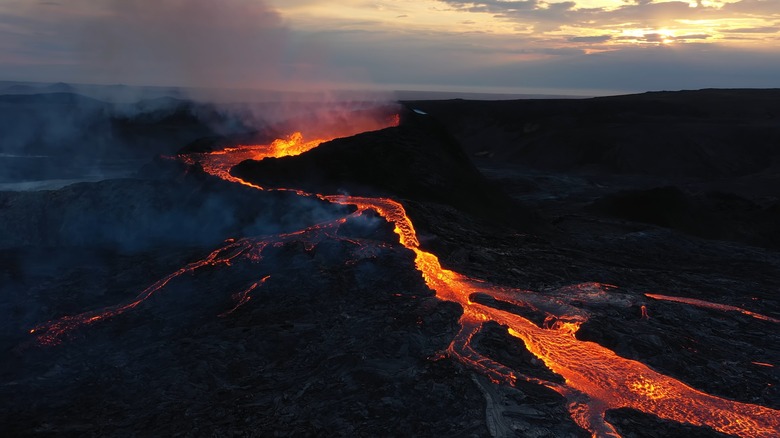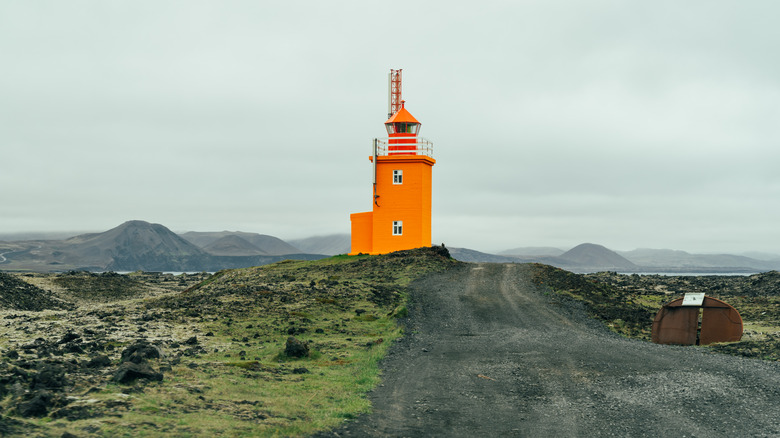What Happens If Iceland's Mount Fagradalsfjall Erupts?
Currently considered to be an active volcano, meaning it could erupt at any time, Mount Fagradalsfjall showed signs of erupting in November 2023. Per the BBC, it is estimated by the Icelandic meteorological office that the volcano is likely to erupt anytime, but what does this mean for the people of Iceland? The last time this particular volcano erupted was in 2021, though it was a relatively small affair that didn't cause any major disruption (via Visit Iceland).
If Fagradalsfjall does erupt, the damage it could cause depends on exactly how it erupts. Per CNN, Michele Paulatto, a research fellow at Imperial College London, said in a statement that magma hitting the seawater could cause a worse aftermath. "If it (the volcano) erupts undersea, it could cause a Surtseyan eruption similar to the one that happened in 1963, also in Iceland, and created the island of Surtsey. That particular eruption lasted several years, so this is a possibility." Paulatto stated. Though the scale of the eruption cannot necessarily be predicted, some precautions have already been taken.
The activity of the volcano has caused 1 town to be evacuated
According to the BBC, the nearby town of Grindavik has been evacuated for safety due to the gases emitted from the volcano and a potential fire risk. However, even if and when the volcano erupts, the people of Grindavik may not be able to return to their homes. As Dr. Bill McGuire, professor emeritus of Geophysical & Climate Hazards at University College London, explained, "Grindavik is very close to the position of the new fracture, and its survival is far from assured. Everything depends upon where magma eventually reaches the surface, but the situation doesn't look good for the residents of the town."
However, even if Mount Fagradalsfjall does erupt, the extent of the damage may not be overly drastic. In a statement reported by CNN, volcanologist Dave McGarvie stated, "not all dikes (bodies of magma that create fractures) breach the surface to form eruptions ... perhaps only one in every three or four." He went on to say that, in a positive scenario, the dikes will naturally cool down and become solid, stopping them from erupting.
Areas outside of Grindavik are less likely to be affected
Moreover, according to Insider, you shouldn't cancel your travel plans just yet. It seems likely flights will still continue to go ahead, though local flights may be the exception to this. While popular tourist destination the Blue Lagoon has been temporarily closed due to its proximity to the volcano, Reykjavik, the capital of Iceland, is mostly just experiencing small tremors and has not been cited as a dangerous place to be by Icelandic authorities.
The Icelandic Met Office released an update on November 13, 2023, stating that while earthquakes are still being caused by the magma intrusion of Mount Fagradalsfjall, "the size and intensity of the activity is decreasing." On November 14, the agency said there had been 700 small earthquakes to date along the magma intrusion line, where there is a high likeliness it will erupt. Speaking to the BBC, Icelandic geophysicist Dr. Evgenia Ilyinskaya said that an eruption that will have negative consequences for air quality in the Northern Hemisphere is "not the situation that is likely at the moment." Nevertheless, until it erupts, the scale of the damage caused is impossible to predict fully.


